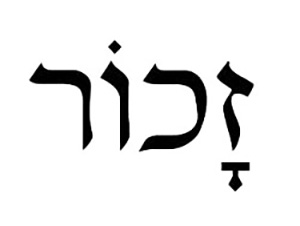
Since Parshat Zachor is upcoming, I thought it would be appropriate to deal with the root Z-C-R. I actually dealt with this topic before. (Do you remember?!) But this is an improved version.
As we all know, the letters Z-C-R generate two different words in Hebrew: male and remember. Is there a connection or is this merely a coincidence? In my youth (in the pre-cellphone, pre-texting era), there were always jokes about husbands forgetting their wives’ shopping instructions. Surely those wives will deny any connection! But we have to initially presume there is a connection, and see if we can uncover it.
- S. Mandelkern makes the suggestion that it is only through males that the family’s name and memory are perpetuated. See his concordance, p. 355.
Alternatively, Rav S. R. Hirsch writes (comm. to Ex. 23:17): “the special function of [males] … is “zocher,” to form the chain of tradition of the human race, by which the achievements of each age are handed down from generation to generation.” With this in mind, Rav Matityahu Clark, in his Etymological Dictionary of Biblical Hebrew (based on the commentaries of Rav Hirsch) defines Z-C-R as “male; bearer of tradition.”
How does my favorite source, Theological Dictionary of the Old Testament, deal with the two meanings of Z-C-R? To give you some background, this a multi-volume work with essays on all the important words of the Tanach. (But it limits itself to “theological” words, i.e., words that have religious significance. There are no essays on mundane words.) Each essay is composed by a different author.
In the article on “Z-C-R/remember,” the author writes that Z-C-R with the “male” meaning “does not belong to the same root, although many attempts have been made to find a common background.” In the article on “Z-C-R/male,” the different author writes that a connection with the root Z-C-R/remember has often been conjectured, “but this remains obscure and unsupported.” So we struck out two times in this work!
Nevertheless, I am going to mention one “memorable” suggestion.
I first have to admit that I have been misleading you a bit when I describe one branch of the root Z-C-R as meaning “remember.” This branch of Z-C-R is not used exclusively with reference to past events. It can be used with reference to future events as well. (See, e.g., Isaiah 47:7 and Eichah. 1:9.) A broader and more accurate summary of this branch of Z-C-R is “an active cognitive occupation with a person or situation.” (See Theological Dictionary of the Old Testament, p. 66.) I am going to loosely paraphrase this as “having something on your mind.”
Looking at the other branch of Z-C-R, we have to realize that it may not have originally meant “male.” Rather, a widespread view is that it originally meant the male sexual organ. See, e.g., Ernest Klein, A Comprehensive Etymological Dictionary of the Hebrew Language, p. 198 and Theological Dictionary of the Old Testament, p. 83. Evidence for this is that in Arabic, their root “dhakar” means both “male” and the male sexual organ. The next reasonable conjecture, given the primary function of the male sexual organ, is that Z-C-R was originally a verb that meant something like “pierce.” (There is a similar-sounding Hebrew root in Tanach, D-K-R, that means “pierce.”)
Accordingly, the two concepts we are trying to relate would not be “males” and “memory,” but “pierce” and “having something on your mind.” The connection suggested is that when you have something on your mind, this is because it has pierced itself into your mind. Perhaps this was the way that “having something on your mind” was looked at in the ancient world. One scholar who cites this suggestion with approval is Ernest Klein, A Comprehensive Etymological Dictionary, p. 198.
I am not convinced that this suggestion is correct but I am not ready to rule it out either. Whether you agree or not, I hope you remember this penetrating insight!
***
Another interesting word in Parshat Zachor is ayef (tired). This word appears many times in Tanach, but so does yaef, which also means tired. One is spelled ayin, yod, pe. The other is yod, ayin, pe. What is going on here? Are there two different kinds of tiredness? Most likely, this is just a case of metathesis (switching of letters). The original word was probably yod, ayin, pe (as we recite it in the morning blessings). Because this is hard to say, the variant ayin, yod, pe arose, slightly easier to say. Another likely example of metathesis in Tanach is the case of keves and kesev. It is unlikely that these are two different kinds of lambs. Rather, keves is the original form and kesev is merely a later-arising variant. Finally, the Tanach has both simlah and silmah for a garment. The former was likely the original form. (There was once a shul in Teaneck that had a Chamesh Megillot scroll that was later discovered to have a mistake in it. What was the mistake? It was a simlah vs. silmah error!)
By Mitchell First
Mitchell First is an attorney and Jewish history scholar. He may forget to tell you but he has a very good memory. He can be reached at MFirstAtty@aol.com.
For more articles by Mitchell First, and information on his books, please visit his website at rootsandrituals.org.










